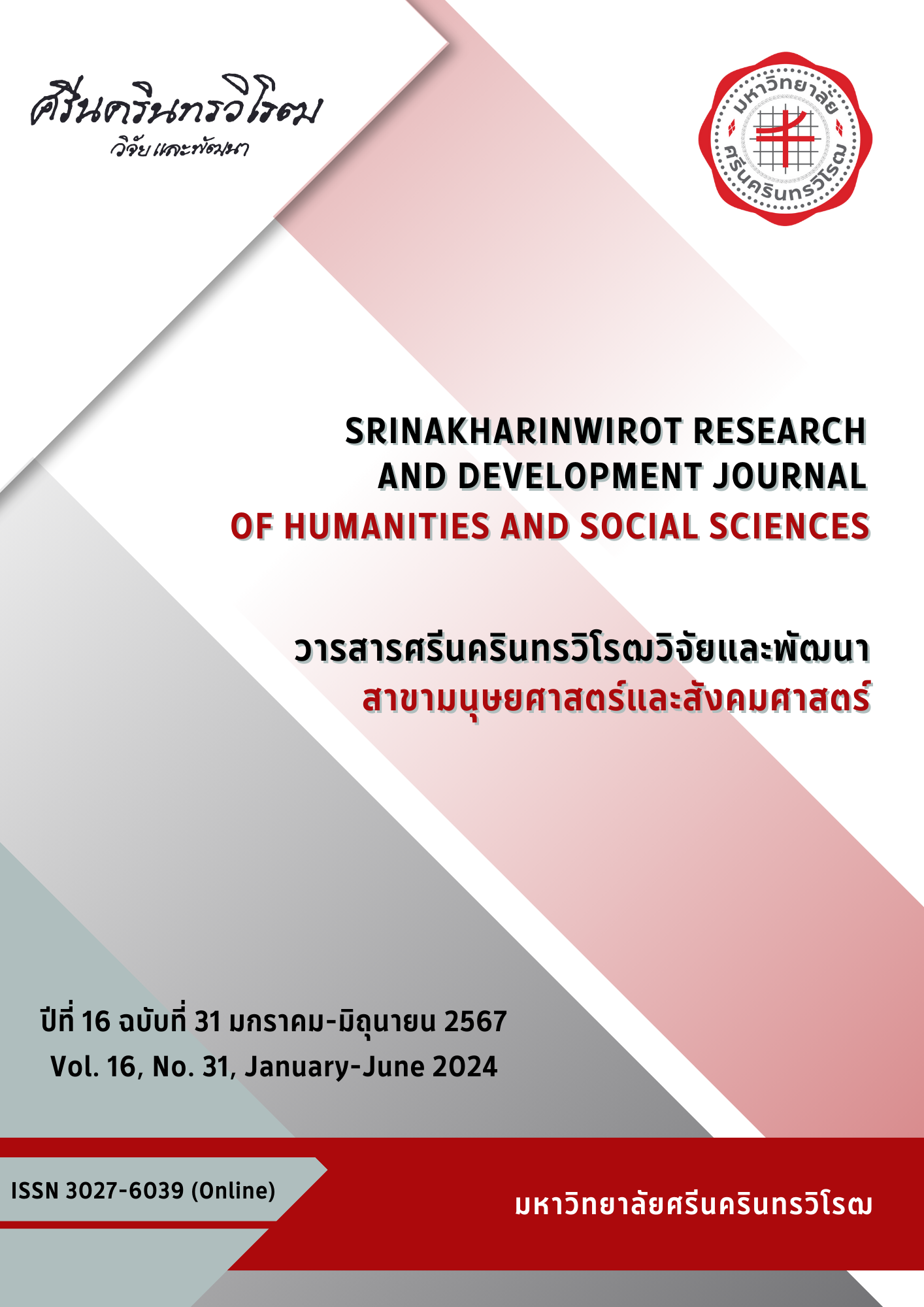THE RESULTS OF THE COMPARISON SELF-CARE KNOWLEDGE, DEPRESSION AND SELF-EFFICACY AMONG THE ELDERLY IN THE COMMUNTY CHANTHABURI PROVINCE USING SELF-EFFICACY PROGRAMS TO PREVENT DEPRESSION
Keywords:
Depression, Elderly, Self-Care, Self-EfficacyAbstract
The objective of this research was study depression levels, knowledge of self-care of the elderly. And compare depression self-care knowledge and self-efficacy to prevent depression from using self-efficacy programs to prevent depression. There were 400 subjects for the baseline study and 60 subjects were used in the experiment by purposive random sampling. General information inquiry form Self-Care Knowledge Test Depression Assessment and self-efficacy assessments to prevent depression. The questionnaire's IOC value, each question was greater than 0.66, and the self-care knowledge test was confidence. And the self-efficacy assessment questionnaire to prevent depression were .78, .85, respectively. The data were analyzed by descriptive statistics and t-test. The research findings were as follows: 1) The elderly had a low level of symptoms of depression overall (= 9.12, S.D. = 3.37) when considered item by item. In descending order, they were uneasy, depressed, discouraged (
= 9.36, S.D. = 3.49), followed by difficulty falling asleep or staying awake or sleeping too much (
= 9.34, S.D. = 3.45), boredom, uninterested. What did you do (
= 9.20, S.D. = 3.47) and the item with the lowest score was self-harm or do you think it would be good to die (
= 8.80, S.D. = 3.20) respectively. 2) The mean of depression among the elderly group than the control group was statistically significant level. 01 (t = -14,621, Sig. = .000) show that the efficacy of self-defense. Depression of the elderly in the community resulted in a satisfactory reduction in the elderly's post-training depression. 3) The average self-care knowledge of the elderly between the experimental group and the control group was found to be statistically insignificant at the .05 level (t = 0.891, Sig. = .380). and 4) The experimental group had significantly higher self-efficacy to prevent depression than the control group at the .01 level (t = 27.246, Sig.).
Downloads
References
พระราชบัญญัติผู้สูงอายุ. (2560). สืบค้นเมื่อ 18 กุมภาพันธ์ 2565, จาก http://law.m-society.go.th/law2016/uploads/lawfile/5a543f71eaddd.pdf
กิริยา ตั๊นสวัสดิ์, และบุญเชิญ หนูอิ่ม. (2557). ปัจจัยเกื้อหนุนและสุขภาวะที่ผู้สูงอายุได้รับจากการเข้าร่วมทำงานอาสาสมัครในโรงพยาบาลชลบุรี. วารสารวิชาการมนุษยศาสตร์และสังคมศาสตร์, 22(39), 263-277.
จิราภรณ์ สีดาพล, ศักดิ์ขรินทร์ นรสาร, และวิไลวรรณ วัฒนานนท์. (2559). การถอดบทเรียนการสร้างเสริมสุขภาพผู้สูงอายุอย่างมีส่วนร่วมภายใต้รูปแบบโรงเรียนผู้สูงอายุ (โรงเรียนมั่นยืน). สืบค้นเมื่อ 5 มิถุนายน 2559, จาก http://www.eresearch.ssru.ac.th/xmlui/handle/123456789/1110
Hui, D., De La Cruz, M., Mori, M., Parsons, H. A., Kwon, J. H., Torres-Vigil, I., Kim, S. H., Dev, R., Hutchins, R., Liem, C., Kang, D.-H., and Bruera, E. (2013). Concepts and definitions for supportive care, best supportive care, palliative care, and hospice care in the published literature, dictionaries, and textbooks. Supportive Care in Cancer, 21(3), 659-685.
กรมสุขภาพจิต กระทรวงสาธารณสุข. (2561). กรมสุขภาพจิต ติงข้อมูลฆ่าตัวตายของไทยในโซเชียลมีเดีย ไม่จริง!! ยืนยัน!! สถิติของไทยอยู่ที่แสนละ 6.35 คน. สืบค้นเมื่อ 27 ธันวาคม 2562 จาก https://www.dmh.go.th/news-dmh/view.asp?id=28149
อาริยา สอนบุญ, อุไร จำปาวะดี, และทองมี ผลาผล. (2562). วิถีการดูแลสุขภาพผู้สูงอายุในชุมชน: ความหมายและการจัดการ. วารสารการพยาบาลและการดูแลสุขภาพ, 37(1), 241-248.
Beck, A. T. (1967). Depression: Clinical, experimental, and theoretical aspects. New York: Harper Row.
Arffman, R. (2012). Social Support Promoting Coping for Caregivers Caring of People with Alzheimer’s disease. https://www.theseus.fi/bitstream/handle/10024/52433/thesis.pdf?sequence=1&isAllowed=y
จิรนันท์ ปุริมาตย์. (2561). ปัจจัยที่มีอิทธิพลต่อคุณภาพชีวิตของผู้ดูแลผู้สูงอายุที่มีภาวะพึ่งพิง ในจังหวัดจันทบุรี [วิทยานิพนธ์ปริญญามหาบัณฑิต ไม่ได้ตีพิมพ์]. มหาวิทยาลัยมหิดล.
มาริสา อุทยาพงษ์. (2560). การประยุกต์ใช้การเจริญสติ เพื่อป้องกันผู้ที่มีภาวะซึมเศร้า. วารสารบัณฑิตศึกษาปริทรรศน์, 13(2), 167-191.
Bandura, A. (1997). Self-efficacy: Toward a unifying theory of behavioral change. Psychological Review, 84(1), 191-215.
Downloads
Published
How to Cite
Issue
Section
License
Copyright (c) 2024 Srinakharinwirot Research and Development Journal of Humanities and Social Sciences

This work is licensed under a Creative Commons Attribution-NonCommercial-NoDerivatives 4.0 International License.
Srinakharinwirot Research and Development Journal of Humanities and Social Sciences is licensed Under a Creative Commons Attribution-NonCommercial-NoDerivs 4.0 International (CC-BY-NC-ND 4.0) License, Unless Otherwise Stated. Please Read Journal Policies Page for More Information on Open Access, Copyright and Permissions.



